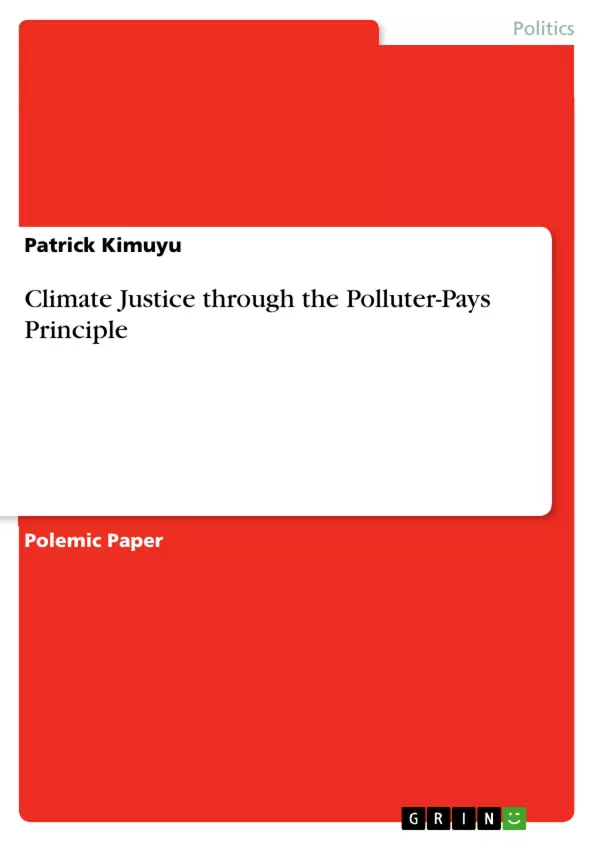It is evident that the environment is experiencing immense consequences from the impact of pollution. One of the most challenging issues related to the degradation of the environment owing to pollution is the phenomenon of climate change. Climate change explains the adverse effects of environmental degradation and pollution is the principal cause of this life-threatening phenomenon. Despite the remarkable progress achieved in combating environmental pollution through environmental policy approaches, there is a need for climate justice in which the polluter will be held responsible for the damage caused to the environment.
In theory, this is the approach of the so-called Polluter Pays Principle. This approach appears relevant in addressing issues related to environmentally-mediated to humans. Despite the endless debate on issues of morality and justice, especially in America, the tenets of climate justice should be upheld by enforcing environmental policies that require the polluter to pay.
Therefore, this argumentative essay will present an array of aspects that explain why the polluter should pay. It will discuss property rights, economic efficiency, tradable permits, and provide the means on how polluters can pay.
Inhaltsverzeichnis (Table of Contents)
- Climate Justice through the Polluter-Pays Principle
- Environmental Liability and the Polluter Pays Principle
- Property Rights and the Polluter Pays Principle
- Justice, Liberty and the Polluter Pays Principle
- Economic Efficiency and the Polluter Pays Principle
- How Polluters Can Pay
Zielsetzung und Themenschwerpunkte (Objectives and Key Themes)
This essay argues in favor of the Polluter Pays Principle as a means of achieving climate justice. It presents a range of arguments supporting the principle's application in environmental policy.
- The importance of holding polluters accountable for the damages caused to the environment and other people.
- The alignment of the Polluter Pays Principle with property rights and fundamental justice.
- The economic efficiency benefits of the Polluter Pays Principle.
- Practical methods for implementing the Polluter Pays Principle, including tradable permits, excise taxes, and market-based incentives.
Zusammenfassung der Kapitel (Chapter Summaries)
- The essay begins by establishing the Polluter Pays Principle as a central concept in achieving climate justice. It argues that polluters should bear the costs of mitigating and adapting to climate change. The principle is presented as consistent with international law and promotes personal responsibility.
- The essay then delves into the connection between property rights and the Polluter Pays Principle. It asserts that fundamental rights prohibit causing harm to others, including environmental damage. The author contends that polluters should be held financially liable for the harm they cause, as this aligns with principles of justice and fair play.
- The essay further emphasizes the link between justice, liberty, and the Polluter Pays Principle. It posits that individual liberty is not absolute and that individuals have a responsibility for the consequences of their actions, particularly when they affect others. The principle promotes this balance between liberty and accountability.
- The essay explores the economic implications of the Polluter Pays Principle, arguing that it promotes economic efficiency. By internalizing the costs of pollution, polluters are encouraged to adopt environmentally friendly practices, preventing negative externalities that harm communities and the environment.
- The essay concludes by examining practical methods for implementing the Polluter Pays Principle. It discusses the use of tradable permits, excise taxes, and market-based incentives to ensure that polluters bear the costs of their actions.
Schlüsselwörter (Keywords)
The essay focuses on the concept of climate justice and advocates for the implementation of the Polluter Pays Principle as a means of achieving it. Key terms and concepts include environmental liability, property rights, economic efficiency, tradable permits, excise taxes, and market-based incentives. The essay explores the moral and legal justifications for holding polluters accountable for their actions, as well as the practical methods for achieving this goal.
Frequently Asked Questions
What is the Polluter Pays Principle (PPP)?
It is an environmental policy principle requiring that those who produce pollution should bear the costs of managing it to prevent damage to human health or the environment.
How does the PPP relate to property rights?
The essay argues that property rights include the right not to be harmed by others' pollution, making polluters financially liable for the damage they cause.
What are the economic benefits of this principle?
It promotes economic efficiency by internalizing the costs of pollution, encouraging companies to adopt cleaner practices.
What practical methods can implement the PPP?
Methods include tradable permits, excise taxes, and various market-based incentives.
Why is the PPP essential for climate justice?
It ensures accountability and ensures that the financial burden of climate change mitigation falls on the responsible parties rather than the public.
- Citar trabajo
- Patrick Kimuyu (Autor), 2018, Climate Justice through the Polluter-Pays Principle, Múnich, GRIN Verlag, https://www.grin.com/document/413653



